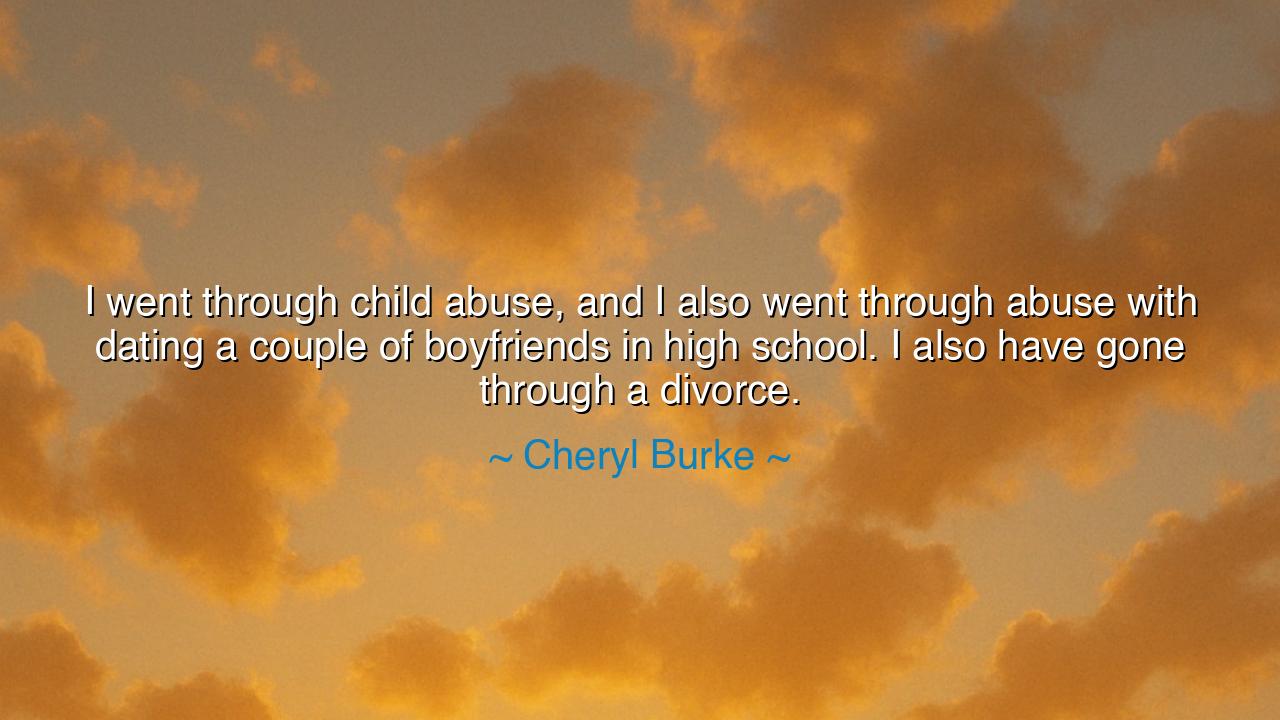
I went through child abuse, and I also went through abuse with
I went through child abuse, and I also went through abuse with dating a couple of boyfriends in high school. I also have gone through a divorce.






The words of Cheryl Burke — “I went through child abuse, and I also went through abuse with dating a couple of boyfriends in high school. I also have gone through a divorce.” — are not spoken for sympathy, but for truth. They rise like a psalm from the ashes, a testament to the unyielding strength of the human spirit. Within these few lines lies a lifetime’s worth of sorrow, endurance, and rebirth. For in confessing her pain, she becomes not a victim, but a vessel of wisdom — one who has walked through the valley of darkness and emerged carrying light for others. Her words are both wound and weapon, reminding us that suffering, when faced with courage, can become the forge of resilience and compassion.
The ancients taught that the soul is tempered in fire. As the blacksmith strikes the iron to make it strong, so too does life strike us through loss, betrayal, and fear. Burke’s confession of abuse — from childhood through love and even marriage — reveals the relentless rhythm of human trial. Each blow she endured could have shattered her; yet instead, it shaped her. Like the phoenix of old, she rose from her own ashes, carrying the scars as symbols of transformation. Her voice speaks not only for herself, but for countless others whose pain remains unspoken. In naming her suffering, she breaks the silence that holds so many captive — and in doing so, turns her wounds into wisdom.
There is a deep nobility in such honesty. For it is far easier to hide one’s pain than to reveal it. But those who reveal it become healers, showing others that vulnerability is not weakness but strength in its truest form. The ancient poets said that even the gods admired mortals who could endure suffering with grace. Think of Job, who in the fires of loss and anguish refused to curse his own being, and instead sought meaning in perseverance. So too does Cheryl Burke’s life echo that eternal truth — that pain, faced with courage, becomes a path toward understanding, a teacher that whispers of endurance, empathy, and the power to begin again.
Consider the story of Harriet Tubman, who was beaten, enslaved, hunted, and scarred — yet she rose to lead others to freedom. The pain of her youth did not extinguish her light; it sharpened it. Like Burke, she transformed abuse into purpose, suffering into service. Such souls remind us that what destroys some can awaken greatness in others. The same fire that burns also purifies. The same tears that fall in sorrow can water the seeds of renewal. It is this alchemy of pain into purpose that makes human beings divine.
Burke’s mention of divorce too carries ancient weight. The ending of love is among the most bitter of human trials. In the days of the ancients, they called it “the sundering of souls,” for two spirits joined in trust are never easily unbound. Yet even here, she teaches through endurance. For to lose love and still continue — to rebuild when the heart is cracked open — is a victory greater than any public triumph. It is the quiet heroism of starting anew, of refusing to let despair dictate one’s destiny. In her story, we hear the whisper of countless others who have lost and yet dared to hope again.
The lesson of her words is not that life is cruel, but that courage is possible. The world will wound us — this cannot be avoided. But within every wound lies a door: the choice to remain broken or to rise transformed. When Cheryl Burke speaks of her past, she invites us all to step through that door. Her story becomes a mirror in which we see our own struggles — and our own strength reflected back at us. What matters is not that we fall, but that we rise each time with greater grace and greater compassion.
So let those who hear her words remember: pain is not the end of your story. It is the beginning of your awakening. When darkness surrounds you, do not curse it — light a single flame. When your heart breaks, do not hide the pieces — build something new with them. Practice patience with your healing, honesty with your wounds, and mercy with yourself. For even the most shattered vessel, when mended with gold, becomes more precious than before. Thus, as Cheryl Burke teaches through her courage, our suffering does not define us — our rising does.






AAdministratorAdministrator
Welcome, honored guests. Please leave a comment, we will respond soon